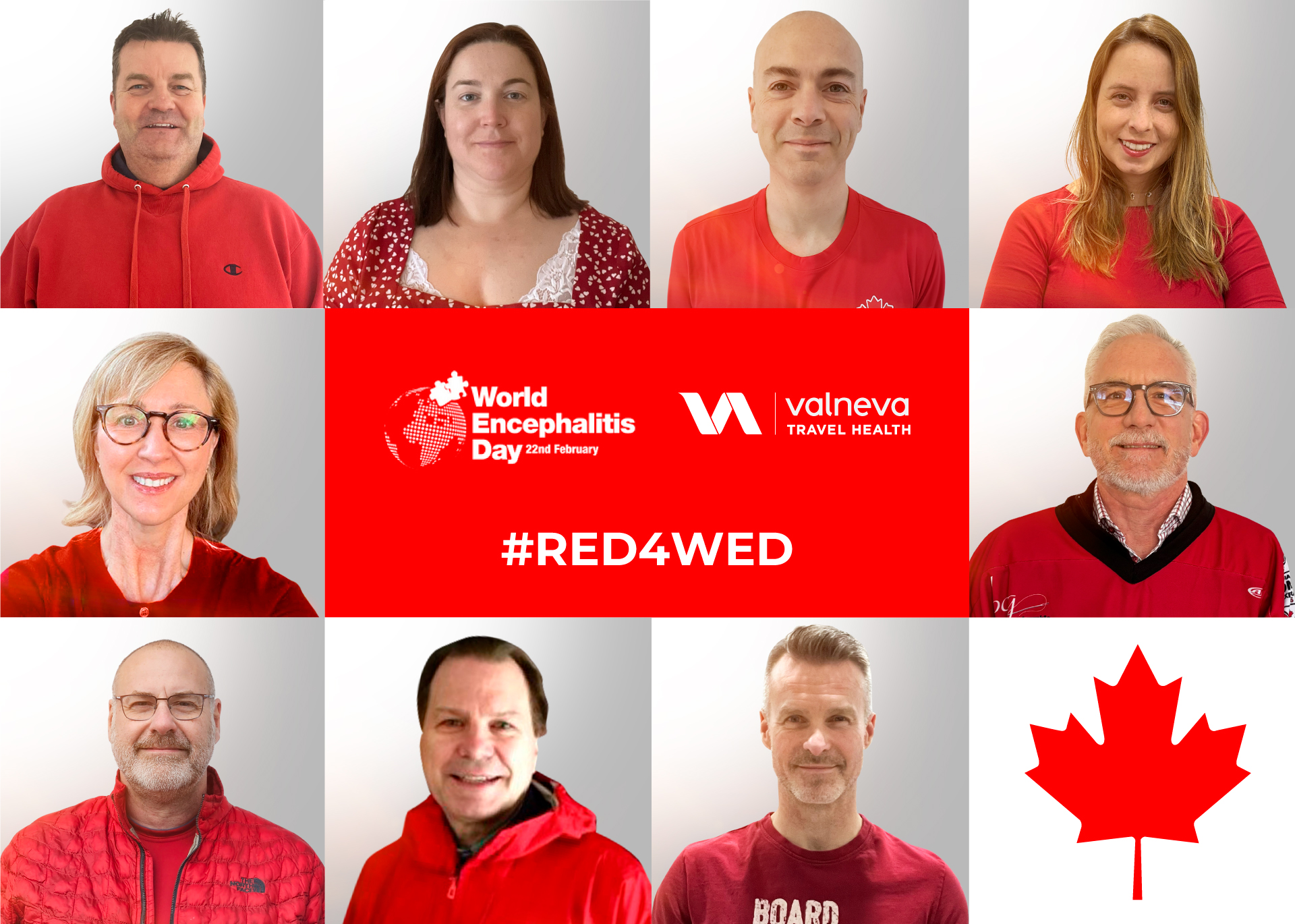World Encephalitis Day: 22 February
World Encephalitis Day is the biggest day of the year for people whose lives have been affected by inflammation of the brain. Since its launch in 2014, World Encephalitis Day has reached 225 million people directly in our efforts to grow international awareness of encephalitis.
Keep reading to see how you can get involved on 22 February 2026!
F.L.A.M.E.S. are spreading…
F.L.A.M.E.S. stands for Flu-like Symptoms, Loss of Consciousness, Acute Headache, Memory Problems, Emotional/Behavioural Changes, Seizures. These are the symptoms most commonly found in both infectious and autoimmune causes of encephalitis.
77% of people have never heard of encephalitis.
We are determined to change this with your support. Our ambition is to see F.L.A.M.E.S. displayed in schools, hospitals, GP clinics, and community spaces, helping ensure that fewer families experience the shock, delay, and devastation that encephalitis so often brings. Every 20 seconds, someone, somewhere in the world is diagnosed with encephalitis. The speed of that diagnosis can save — or change — their life.
We need your help today: download your F.L.A.M.E.S. resources and share these far and wide!
Please note our F.L.A.M.E.S. assets are currently only available in English but we will have translated resources in early 2026, please email us for more details!
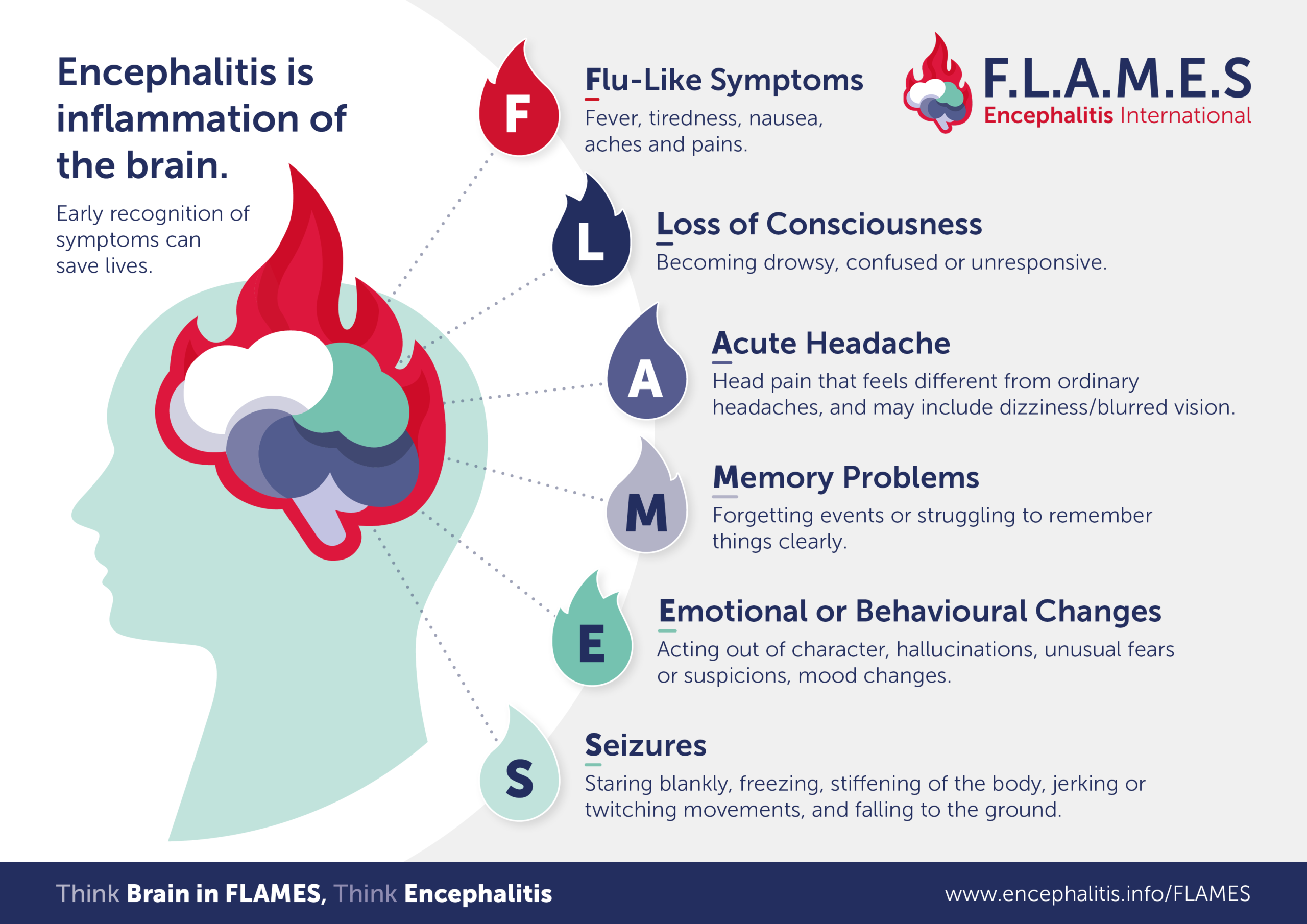
F.L.A.M.E.S. Coming to a billboard near you!
Our F.L.A.M.E.S. graphics are being displayed on billboards across the globe throughout February and beyond.
Thank you to Camino Communications who designed all our F.L.A.M.E.S. assets and to the teams at Landsec, JC Decaux, Lamar Advertising, IDS Media and Sports City Advertising for kindly gifting spaces across their advertising boards.
Click the link below to find your nearest billboard – we’d love for you to take a photo or video and share this with us! Get in touch!
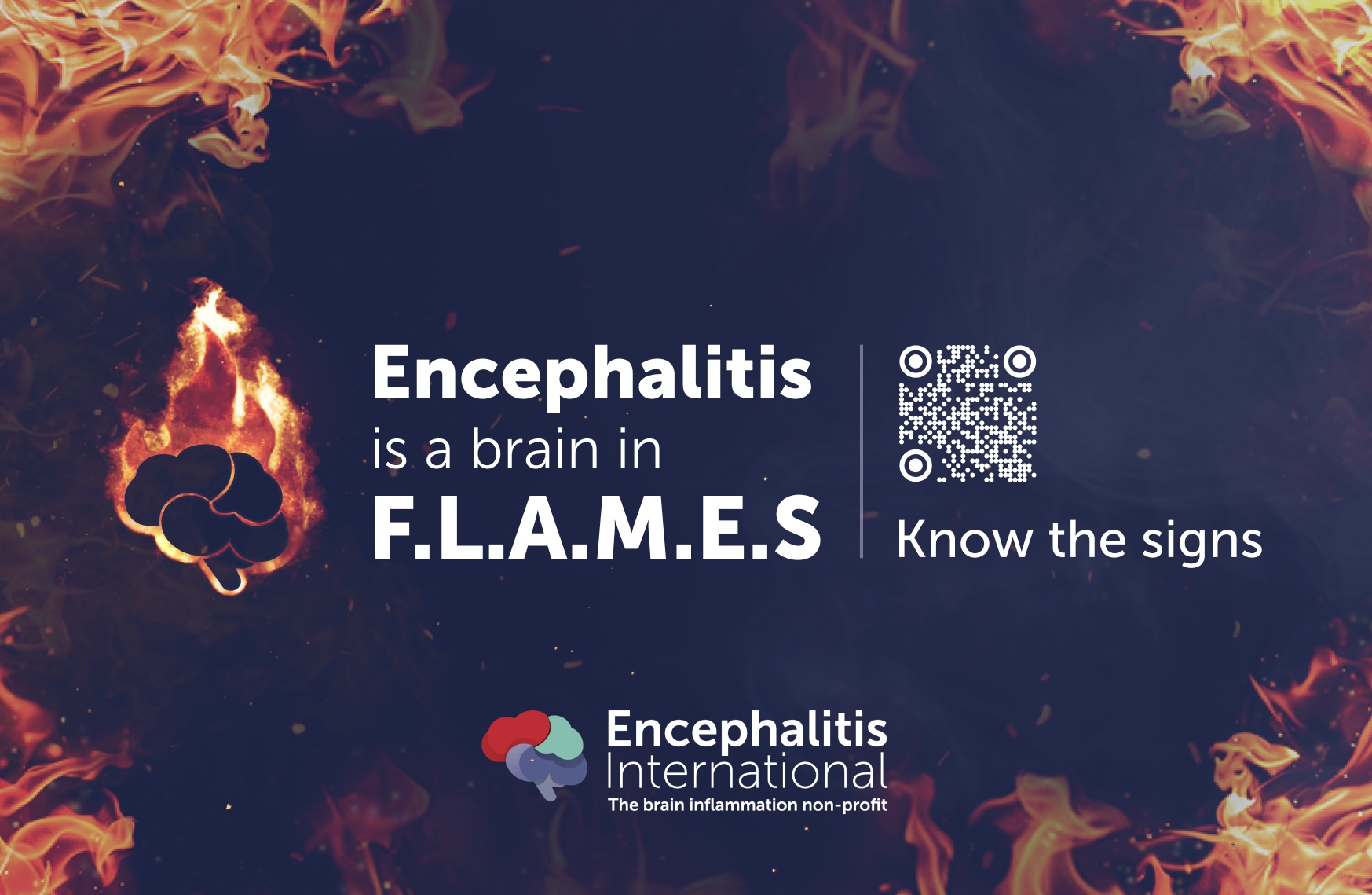
Support our World Encephalitis Day Appeal!
Our World Encephalitis Day Appeal for 2026 is dedicated to amplifying the voices and experiences of people whose lives have been changed by encephalitis.
We aim to raise £50,000 and we need your help!
Will you join the wonderful supporters around the world helping us continue to raise awareness, drive research and provide support for those impacted by encephalitis? Could you donate today?
Our could you set up a WED fundraiser? There are thousands of ways to fundraise, whether you take on a solo mission, or join with family/friends/colleagues. And you’re very welcome to give your fundraiser a colour theme… #Red4WED of course!
Go #Red4WED
Every year we ask our supporters to wear something red on World Encephalitis Day and then share photos or videos on social media, telling their followers about why they are wearing red.
This year we are proud to launch our new, official#Red4WED t-shirts Click here to purchase yours today!
If you are sharing any photos or videos on social media, please use the campaign hashtag #Red4WED and send us a copy, so we can share them with the global encephalitis community!
See the fantastic 2025 #Red4WED images here!

Join a WED gathering!
We will be hosting a number of gatherings on World Encephalitis Day – open to everyone! Join us as we come together from wherever we are in the world to connect, reflect, and raise awareness. Whether you’re affected by encephalitis, support someone who is, or simply want to learn more, this is a chance to be part of a supportive community, hear inspiring stories, and help shine a light on the importance of recognition and understanding. Everyone is welcome.
Gatherings on Sunday 22nd February 2026:
Free online peer support group on 22nd February at 3 pm (GMT). Please select ‘WED online peer group‘ from the drop down menu when registering. Click here to register.
Piccadilly Circus, London, UK: Join the team and fellow encephalitis community members to watch our F.L.A.M.E.S. animation being shown on Piccadilly Circus big screen. The showing is from 11am (GMT) on Sunday 22nd February. Get in touch to let us know you’re joining!
Times Square, New York, USA: Join the team and fellow encephalitis community members to watch our F.L.A.M.E.S. animation being shown on screens at Times Square. The gathering is from 11am (ET) on Sunday 22 February. The animation will be playing throughout the day if you can’t make then! Get in touch to let us know you’re joining!
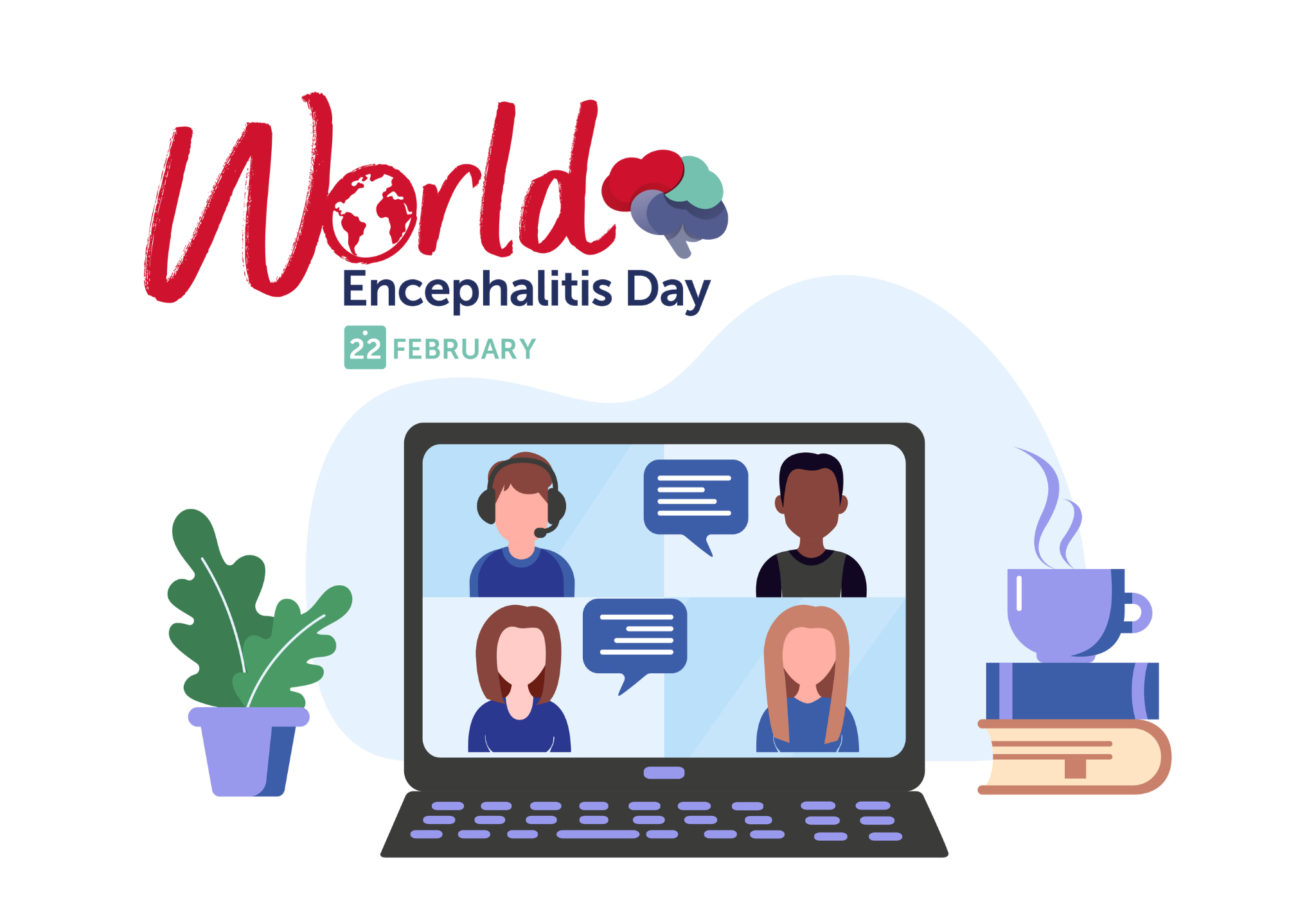
Tune into BBC Radio 4!
We are so proud to announce that BBC Radio 4 will be covering encephalitis and our work on World Encephalitis Day 22 February as one of their appeals. The wonderful Jemma Redgrave (acclaimed British actor) kindly voiced the appeal for us and we can’t wait to hear it live on the day at 7:54am (GMT) and 21:25am (GMT). Tune in here!
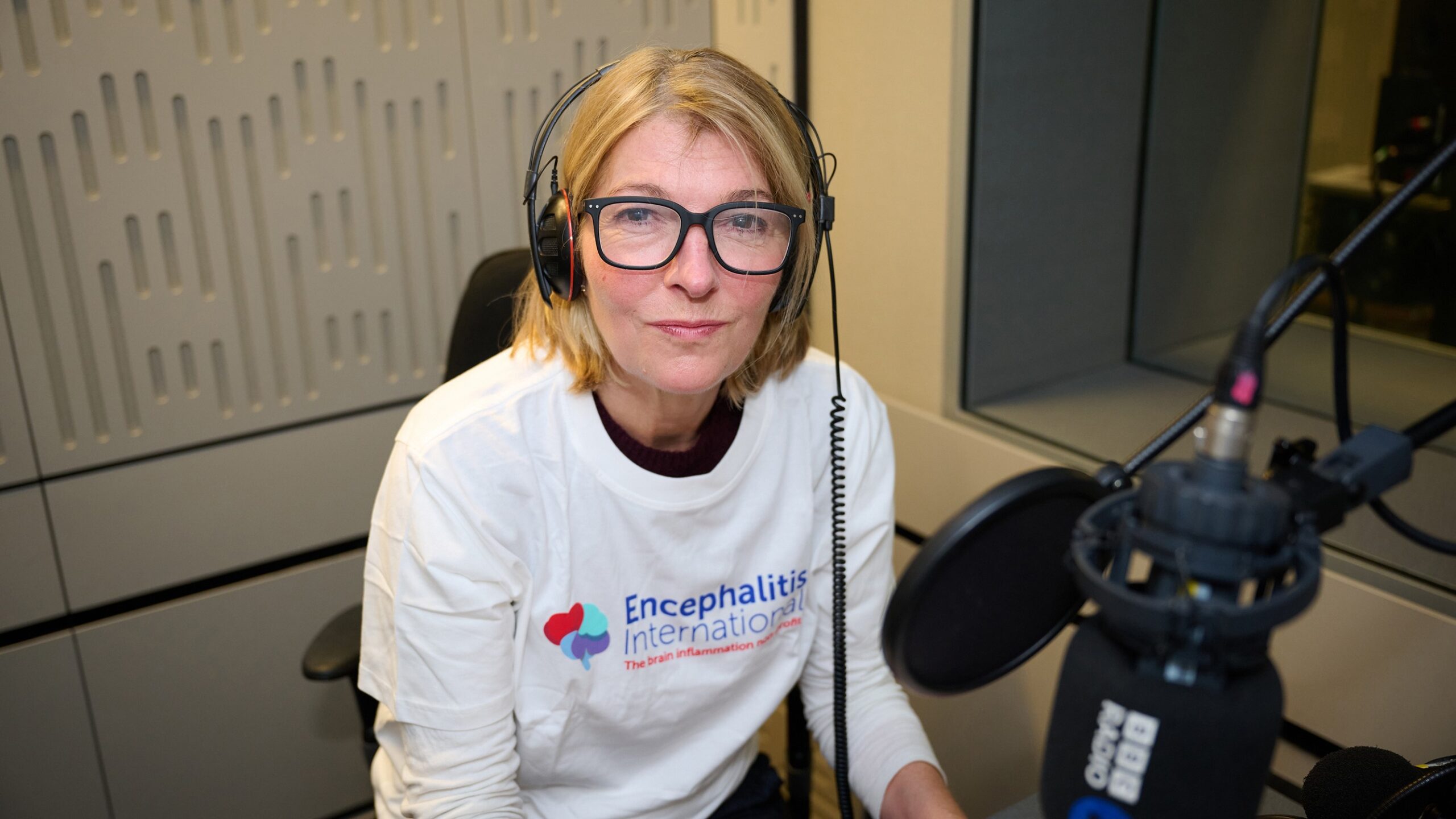
Check Out Our WED 2025 Highlights!
In 2025, the encephalitis community joined together once more to raise awareness and vital funds on World Encephalitis Day. It has been over 5 years since we first began our efforts to engage the World Health Organization (WHO) to support our work following the publication of the Global Impact Report.
Coinciding with World Encephalitis Day 2025, the WHO published a Technical Brief on encephalitis, to engage policymakers and public health officials.
Encephalitis: global threats, trends and public health implications: a technical brief
22 Highlights from 22 February 2025…click here to read our highlights blog.
WED - Official Partners
Encephalitis International is proud to deliver our annual World Encephalitis Day in collaboration with several generous corporate supporters.
If you’re interested in supporting us in 2026 we have a range of campaign partnership opportunities and can be flexible for what suits your organisation. Please get in touch via calum@encephalitis.info.
